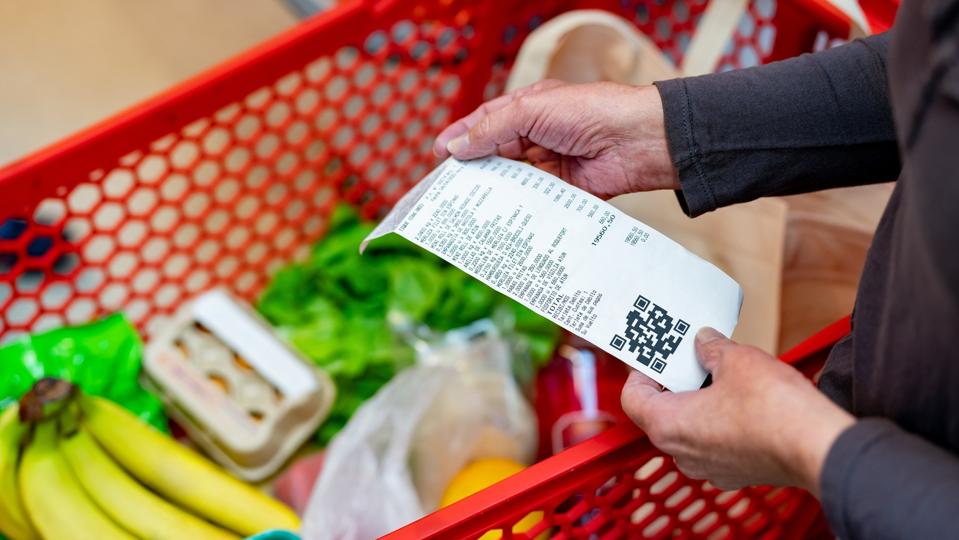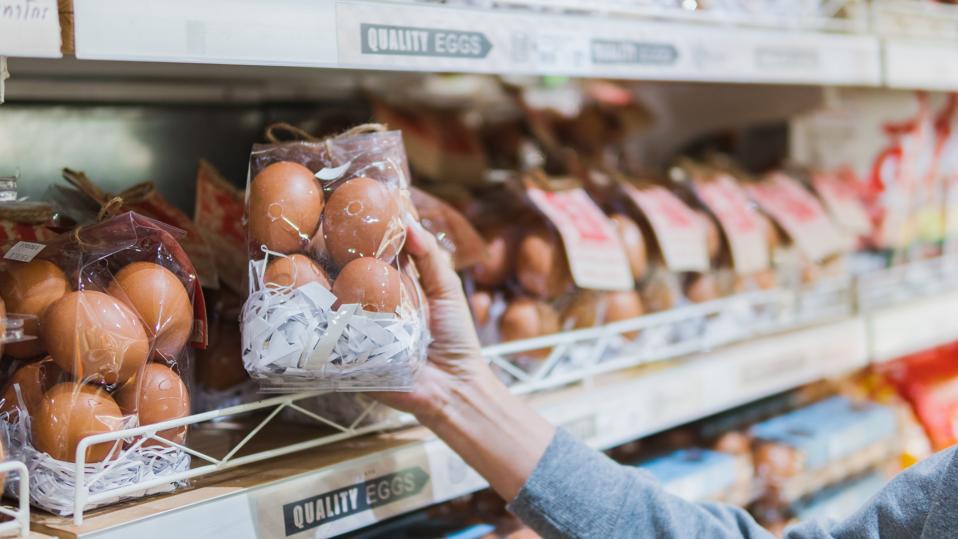Egg prices have cracked $6 per dozen, leaving families scrambling for alternatives. As prices soar, shoppers are adapting—from panic buying to embracing plant-based substitutes. The crisis stems in part from a devastating bird flu outbreak, which has significantly reduced egg supplies by impacting millions of egg-laying hens.
But the egg crisis isn’t just about what’s missing on the shelves—it’s reshaping how we cook, what we eat, and where our food comes from. Let’s explore how shoppers are adapting—and what these changes mean for the future of food in 2025.
Shoppers and the Sticker Shock
With egg prices up 28% and purchases down 15%, the price of eggs is reshaping grocery budgets. … [+]
getty
Egg prices rose 28% year-over-year during early January 2025, with the average price hitting $6.30 per dozen across major brands, according to Earnest Analytics. In California, prices spiked as high as $8.85 due to regional regulations and seasonal demand. These increases have made eggs, once an affordable staple, feel like a luxury for many households.
Higher prices have also affected consumer behavior. Sales dropped by 15% compared to January 2024, reflecting how rising costs are forcing shoppers to adjust. On platforms like Reddit, users are sharing tips for finding affordable options or swapping out eggs in recipes.
A Purdue University study found that shoppers see food prices, including eggs, as rising faster than other household costs. To cope, consumers are buying less, switching to generic brands, and hunting for discounts—all trends shaping today’s egg market.
How Shoppers Are Adapting
From Costco egg prices to eggless recipes trending on TikTok, shoppers are turning to creative … [+]
getty
Despite high prices, consumers are finding ways to adjust:
- Turning to Egg Substitutes: Plant-based alternatives like JUST Egg are thriving. These products offer sustainable, affordable options that work well for cooking and baking.
- Getting Creative in the Kitchen: According to Technomic’s 2025 foodservice predictions, chefs and home cooks are embracing trends like salted egg yolk cocktails and eggless desserts. Social media platforms like TikTok are amplifying this creativity, with trends like “egg flights” featuring unusual toppings like truffle oil and edible gold.
- Exploring Local Options: Farmers’ markets and backyard chicken coops are thriving. Local producers report increased demand for fresh eggs, aligning with Technomic’s insights into hyper-local food systems.
- Adjusting Habits: Price-conscious shoppers are switching brands, buying in bulk when prices dip, or opting for smaller quantities to balance their budgets.
From Costco and Walmart egg prices to social media food trends, the egg crisis has prompted resourceful responses from households nationwide.
Long-Term Impacts on Shopper Behavior
Will egg prices go down in 2025? With prices correlated to purchasing trends, the egg shortage is … [+]
getty
While the egg shortage may be temporary, its effects could last much longer. Research shows a strong correlation between rising prices and reduced purchases, highlighting how sensitive consumers are to price fluctuations.
According to USDA projections, egg production will decline by only 1% in 2025, signaling gradual recovery. However, habits formed during the shortage—like experimenting with plant-based alternatives or sourcing eggs locally—are likely to persist. Rising gas prices, along with food inflation, are straining household budgets, pushing consumers to rethink not only their grocery lists but also how they approach everyday meals. As budgets tighten, consumers are exploring sustainable and flexible food choices, reflecting broader trends toward resilience in food systems.
This struggle to adapt isn’t just anecdotal. The egg crisis highlights deeper issues of food affordability and access. Purdue University’s Consumer Food Insights report found food inflation disproportionately affects vulnerable groups, with 26% of consumers in poor health experiencing food insecurity compared to just 8% in excellent health.
Rethinking the Cart
Egg prices dropping may take time, but creative shoppers are already turning to plant-based options, … [+]
getty
The 2025 egg shortage isn’t just about soaring costs—it’s reshaping how we shop, cook, and think about food. From eggless baking trends to backyard chicken farming, shoppers are proving their ability to adapt in the face of scarcity. As we wait to see if and when egg prices will go down, it’s clear that this crisis has left a lasting mark on how we approach our food systems.
Curious about how trends and food news like rising egg prices shape our lives? Follow me here on Forbes for stories about the way food connects, challenges, and inspires us.




